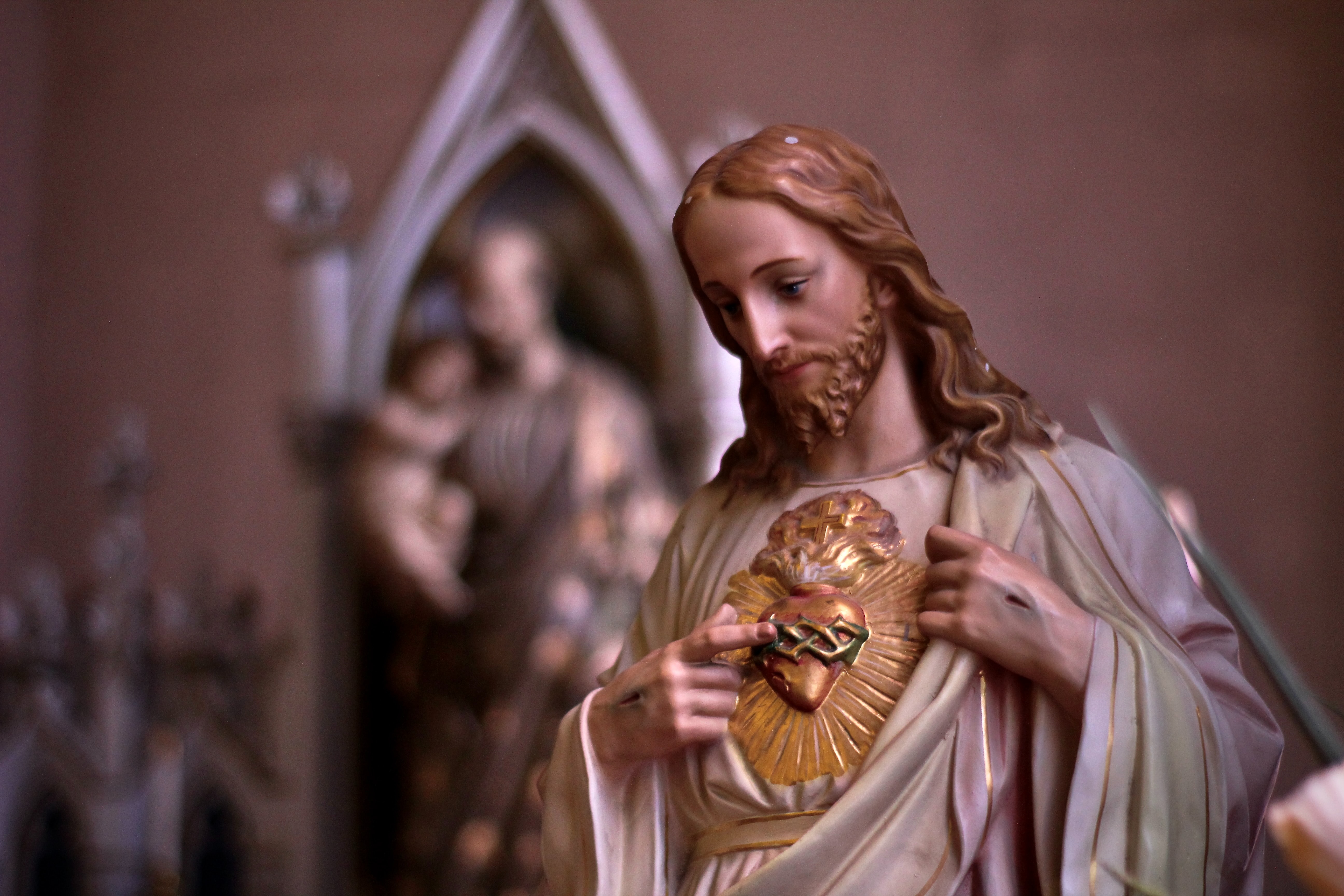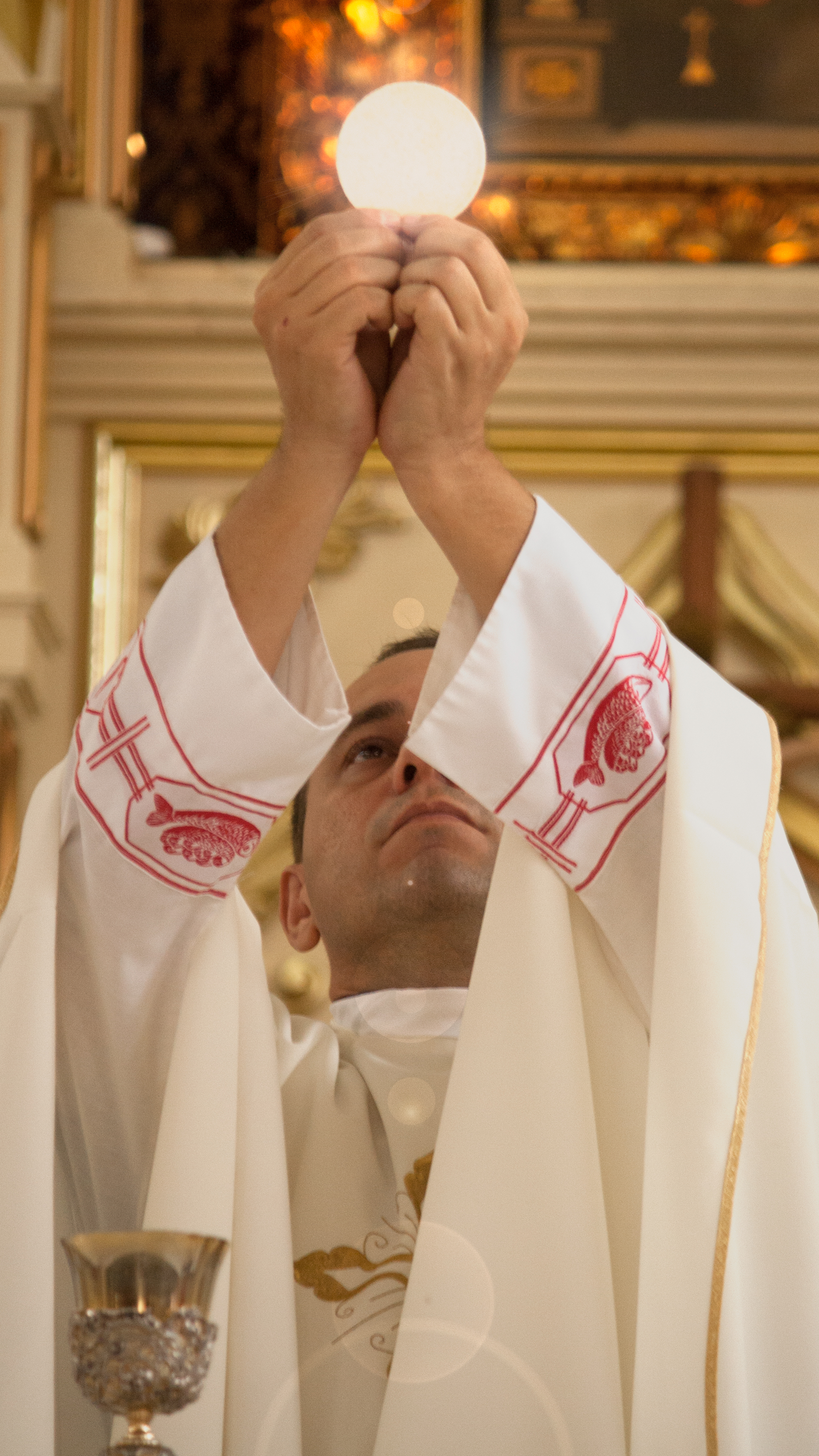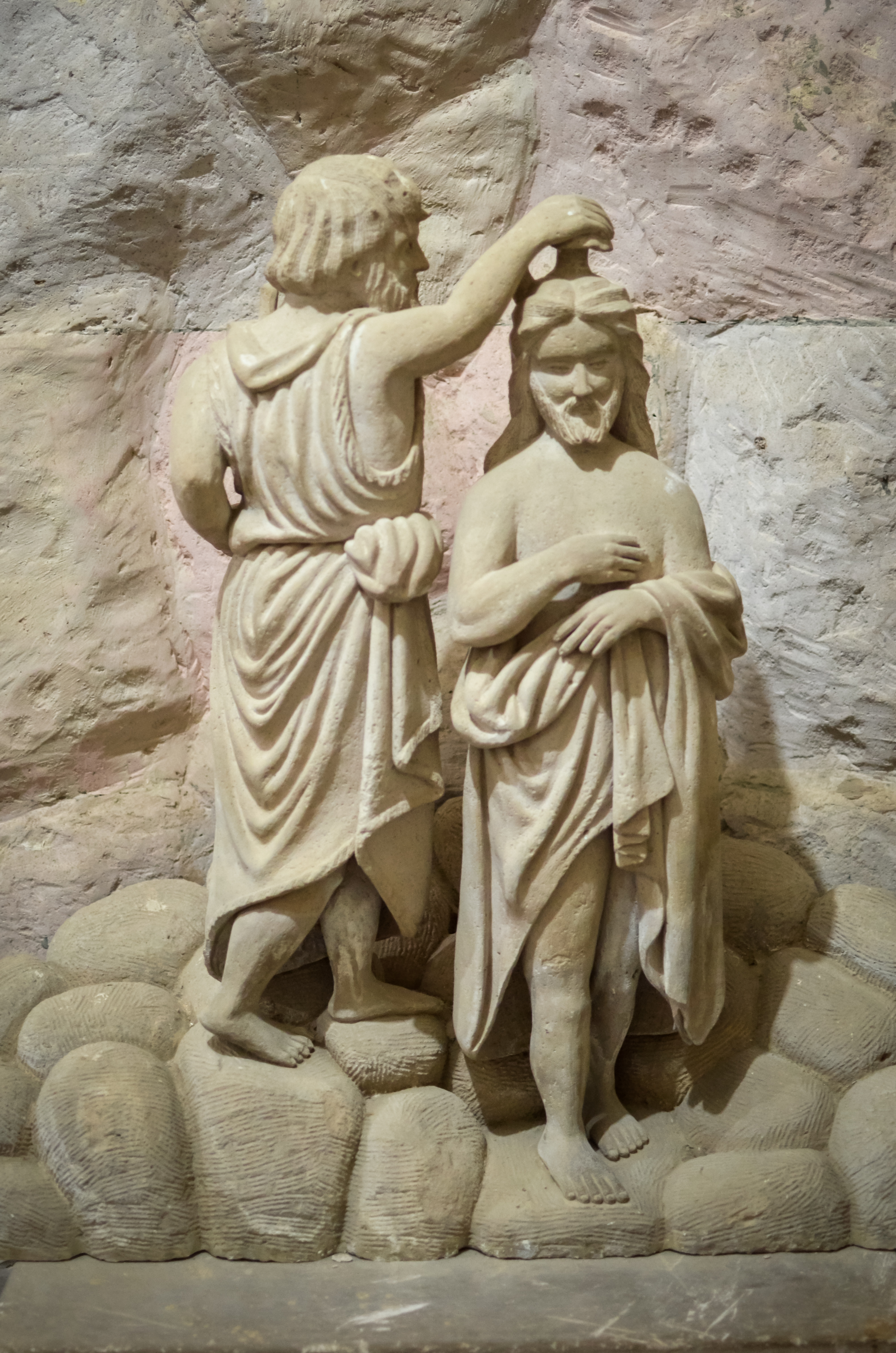In the First Reading today, we hear that the Lord said of the Israelites, “I will be their God, and they shall be my people.”
That line has always given me such joy, for we know that this promise extends to us. All of the promises God made in the Old Testament were fulfilled in the New. And now we are His people. Imagine that!
God doesn’t need us, yet He wants us. His love is so immense and so unfathomable that we can only imagine a fraction of it.
I see such loneliness in the world. Sometimes I even feel it myself. But when I read these words, I feel buoyed. We are God’s people. We belong to Him. We can take solace in the fact that, even if no one else in the world wants or loves us, God wants us. God loves us. We are His!
The world can be a crazy place. We have seen an increase in violence, in drug use, in division with our fellow Americans, and in outright hostility. It’s so hard to feel happy sometimes. We look around and see so many reasons for despair. But that is not what God wants for us. He wants us to be filled with joy—joy in Him.
We all know that happiness is fleeting. We don’t feel happy every moment of our lives. And we don’t need to. But joy is different. Joy comes from within—it comes from our relationship with God. Joy fills us when happiness cannot. And the beautiful thing about joy is that it cannot be contained. By its very nature, it must spill over.
Anyone familiar with Fr. Mike Schmitz knows what I’m talking about, as he is a perfect example of someone who has joy in Christ. Imagine if we all had that kind of joy! What an amazing world this would be.
So, today, I challenge you to read God’s word. Find phrases in the Bible that give you joy. Write them down and put them in places where you will see them multiple times throughout your day. Read books about our faith. Immerse yourself in God’s love. Open your heart and invite Him in. You will be amazed at the transformation.
And never forget His love for us all. We are His people. And we are never alone.
En la Primera Lectura de hoy, escuchamos que el Señor dijo de los israelitas: “Yo seré su Dios y ellos serán mi pueblo.”
Esa línea siempre me ha dado tanta alegría, porque sabemos que esta promesa se extiende a nosotros. Todas las promesas que Dios hizo en el Antiguo Testamento se cumplieron en el Nuevo. Y ahora somos Su pueblo. ¡Imagínate!
Dios no nos necesita, pero nos quiere. Su amor es tan inmenso y tan insondable que sólo podemos imaginar una fracción de lo que es.
Veo tanta soledad en el mundo. A veces lo siento yo también. Pero cuando leo estas palabras, me siento animada. Somos el pueblo de Dios. Le pertenecemos a Él. Podemos consolarnos con el hecho de que, incluso si nadie más en el mundo nos quiere o nos ama, Dios nos quiere. Dios nos ama. ¡Somos Suyos!
El mundo puede ser un lugar loco. Hemos visto un aumento en la violencia, en el uso de drogas, en la división con nuestros conciudadanos y en la hostilidad abierta. A veces es tan difícil sentirnos felices. Miramos a nuestro alrededor y vemos muchas razones para la desesperación. Pero eso no es lo que Dios quiere para nosotros. Él quiere que estemos llenos de gozo, gozo en Él.
Todos sabemos que la felicidad es pasajera. No nos sentimos felices en cada momento de nuestras vidas. Y eso no es necesario. Pero el gozo es diferente. El gozo viene de adentro—viene de nuestra relación con Dios. El gozo nos llena cuando la felicidad no puede. Y lo hermoso del gozo es que no se puede contener. Por su propia naturaleza, se desborda.
Si conocen quien es el P. Mike Schmitz saben de lo que estoy hablando, ya que es un ejemplo perfecto de alguien que tiene gozo en Cristo. ¡Imagínese si todos tuviéramos ese tipo de gozo! Qué mundo tan asombroso sería.
Entonces, hoy, te motivo a leer la palabra de Dios. Encuentra frases en la Biblia que te llenen de gozo. Anótelos y colóquelos en lugares donde los verás varias veces a lo largo del día. Lee libros sobre nuestra fe. Sumérgete en el amor de Dios. Abre tu corazón e invítalo a entrar. Te sorprenderá la transformación.
Y nunca olvides Su amor por todos nosotros. Somos Su pueblo. Y nunca estamos solos.
 Susan Ciancio has a BA in psychology and a BA in sociology from the University of Notre Dame, with an MA in liberal studies from Indiana University. For the past 19 years, she has worked as a professional editor and writer, editing both fiction and nonfiction books, magazine articles, blogs, educational lessons, professional materials and website content. Thirteen of those years have been in the pro-life sector. Currently Susan freelances and writes weekly for HLI, edits for American Life League, and is the executive editor of Celebrate Life Magazine. She also serves as executive editor for the Culture of Life Studies Program—an educational nonprofit program for K-12 students. You can reach her at slochner0.wixsite.com/website.
Susan Ciancio has a BA in psychology and a BA in sociology from the University of Notre Dame, with an MA in liberal studies from Indiana University. For the past 19 years, she has worked as a professional editor and writer, editing both fiction and nonfiction books, magazine articles, blogs, educational lessons, professional materials and website content. Thirteen of those years have been in the pro-life sector. Currently Susan freelances and writes weekly for HLI, edits for American Life League, and is the executive editor of Celebrate Life Magazine. She also serves as executive editor for the Culture of Life Studies Program—an educational nonprofit program for K-12 students. You can reach her at slochner0.wixsite.com/website.
Feature Image Credit: Jonathan Dick, OSFS, unsplash.com/photos/BJlO1Jt8sdQ


 Christine Hanus currently lives in Upstate, NY. Though she enjoys writing and her work as a catechist, Christine is primarily a wife, mother, and more recently, grandmother!
Christine Hanus currently lives in Upstate, NY. Though she enjoys writing and her work as a catechist, Christine is primarily a wife, mother, and more recently, grandmother!
 Mike Karpus is a regular guy. He grew up in Michigan’s Upper Peninsula, graduated from Michigan State University and works as an editor. He is married to a Catholic school principal, raised two daughters who became Catholic school teachers at points in their careers, and now relishes his two grandchildren, including the older one who is fascinated with learning about his faith. He also has served on a Catholic school board, a pastoral council and a parish stewardship committee. He currently is a lector at Mass, a Knight of Columbus, Adult Faith Formation Committee member and a board member of the local Habitat for Humanity organization. But mostly he’s a regular guy.
Mike Karpus is a regular guy. He grew up in Michigan’s Upper Peninsula, graduated from Michigan State University and works as an editor. He is married to a Catholic school principal, raised two daughters who became Catholic school teachers at points in their careers, and now relishes his two grandchildren, including the older one who is fascinated with learning about his faith. He also has served on a Catholic school board, a pastoral council and a parish stewardship committee. He currently is a lector at Mass, a Knight of Columbus, Adult Faith Formation Committee member and a board member of the local Habitat for Humanity organization. But mostly he’s a regular guy.
 Kathryn Mulderink, MA, is married to Robert, Station Manager for Holy Family Radio. Together they have seven children (including Father Rob), and seven grandchildren. She is President of the local community of Secular Discalced Carmelites and has published five books and many articles. Over the last 30 years, she has worked as a teacher, headmistress, catechist, Pastoral Associate, and DRE, and as a writer and voice talent for Catholic Radio. Currently, she serves the Church by writing and speaking, and by collaborating with various parishes and to lead others to encounter Christ and engage their faith. Her website is
Kathryn Mulderink, MA, is married to Robert, Station Manager for Holy Family Radio. Together they have seven children (including Father Rob), and seven grandchildren. She is President of the local community of Secular Discalced Carmelites and has published five books and many articles. Over the last 30 years, she has worked as a teacher, headmistress, catechist, Pastoral Associate, and DRE, and as a writer and voice talent for Catholic Radio. Currently, she serves the Church by writing and speaking, and by collaborating with various parishes and to lead others to encounter Christ and engage their faith. Her website is 
 Tami Urcia grew up in Western Michigan, a middle child in a large Catholic family. She spent early young adulthood as a missionary in Mexico, studying theology and philosophy, then worked and traveled extensively before finishing her Bachelor’s Degree in Western Kentucky. She loves tackling projects, finding fun ways to keep her little ones occupied, quiet conversation with the hubby and finding unique ways to love. She works at for Christian Healthcare Centers, is a guest blogger on
Tami Urcia grew up in Western Michigan, a middle child in a large Catholic family. She spent early young adulthood as a missionary in Mexico, studying theology and philosophy, then worked and traveled extensively before finishing her Bachelor’s Degree in Western Kentucky. She loves tackling projects, finding fun ways to keep her little ones occupied, quiet conversation with the hubby and finding unique ways to love. She works at for Christian Healthcare Centers, is a guest blogger on 



 J.M. Pallas has had a lifelong love of Scriptures. When she is not busy with her vocation as a wife and mother to her “1 Samuel 1” son, or her vocation as a public health educator, you may find her at her parish women’s bible study, affectionately known as “The Bible Chicks.”
J.M. Pallas has had a lifelong love of Scriptures. When she is not busy with her vocation as a wife and mother to her “1 Samuel 1” son, or her vocation as a public health educator, you may find her at her parish women’s bible study, affectionately known as “The Bible Chicks.”



 Sheryl is happy to be the number 1 cheerleader and supporter for her husband, Tom who is a candidate for the Permanent Diaconate in the Diocese of Kalamazoo. They are so grateful for the opportunity to grow together in this process. Sheryl’s day job is serving her community as the principal for St. Therese Catholic School in Wayland, Michigan. Since every time she thinks she gets life all figured out, she realizes just how far she has to go, St. Rita of Cascia is her go-to Saint for intercession and help. Home includes Carlyn, a very, very goofy Golden Retriever and Lucy, our not-so-little rescue puppy.
Sheryl is happy to be the number 1 cheerleader and supporter for her husband, Tom who is a candidate for the Permanent Diaconate in the Diocese of Kalamazoo. They are so grateful for the opportunity to grow together in this process. Sheryl’s day job is serving her community as the principal for St. Therese Catholic School in Wayland, Michigan. Since every time she thinks she gets life all figured out, she realizes just how far she has to go, St. Rita of Cascia is her go-to Saint for intercession and help. Home includes Carlyn, a very, very goofy Golden Retriever and Lucy, our not-so-little rescue puppy. 
 Kate Taliaferro is an Air Force wife and mother. She is blessed to be able to homeschool, bake bread and fold endless piles of laundry. When not planning a school day, writing a blog post or cooking pasta, Kate can be found curled up with a book or working with some kind of fiber craft. Kate blogs at
Kate Taliaferro is an Air Force wife and mother. She is blessed to be able to homeschool, bake bread and fold endless piles of laundry. When not planning a school day, writing a blog post or cooking pasta, Kate can be found curled up with a book or working with some kind of fiber craft. Kate blogs at